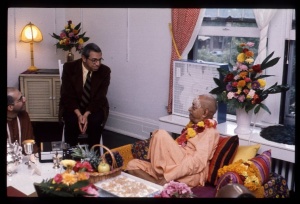CC Madhya 13.137 (1975): Difference between revisions
(Vanibot #0027: CCMirror - Mirror CC's 1996 edition to form a basis for 1975) |
(Vanibot #0020: VersionCompareLinker - added a link to the Version Compare feature) |
||
| Line 2: | Line 2: | ||
<div style="float:left">'''[[Sri Caitanya-caritamrta (1975)|Śrī Caitanya-caritāmṛta (1975)]] - [[CC Madhya (1975)|Madhya-līlā]] - [[CC Madhya 13 (1975)|Chapter 13: The Ecstatic Dancing of the Lord at Ratha-yātrā]]'''</div> | <div style="float:left">'''[[Sri Caitanya-caritamrta (1975)|Śrī Caitanya-caritāmṛta (1975)]] - [[CC Madhya (1975)|Madhya-līlā]] - [[CC Madhya 13 (1975)|Chapter 13: The Ecstatic Dancing of the Lord at Ratha-yātrā]]'''</div> | ||
<div style="float:right">[[File:Go-previous.png|link=CC Madhya 13.136 (1975)|Madhya-līlā 13.136]] '''[[CC Madhya 13.136 (1975)|Madhya-līlā 13.136]] - [[CC Madhya 13.138 (1975)|Madhya-līlā 13.138]]''' [[File:Go-next.png|link=CC Madhya 13.138 (1975)|Madhya-līlā 13.138]]</div> | <div style="float:right">[[File:Go-previous.png|link=CC Madhya 13.136 (1975)|Madhya-līlā 13.136]] '''[[CC Madhya 13.136 (1975)|Madhya-līlā 13.136]] - [[CC Madhya 13.138 (1975)|Madhya-līlā 13.138]]''' [[File:Go-next.png|link=CC Madhya 13.138 (1975)|Madhya-līlā 13.138]]</div> | ||
{{CompareVersions|CC|Madhya 13.137|CC 1975|CC 1996}} | |||
{{RandomImage}} | {{RandomImage}} | ||
==== TEXT 137 ==== | ==== TEXT 137 ==== | ||
<div class="verse"> | <div class="verse"> | ||
:anyera | :anyera hṛda ya-mana, mora mana-vṛndāvana, | ||
: | :'mane' 'vane' eka kari' jāni | ||
:tāhāṅ tomāra pada-dvaya, | :tāhāṅ tomāra pada-dvaya, karāha yadi udaya, | ||
:tabe tomāra pūrṇa kṛpā māni | :tabe tomāra pūrṇa kṛpā māni | ||
</div> | </div> | ||
| Line 20: | Line 19: | ||
<div class="synonyms"> | <div class="synonyms"> | ||
anyera—of others; hṛdaya—consciousness; mana—mind; mora mana—My mind; vṛndāvana—Vṛndāvana consciousness; mane—with the mind; vane—with Vṛndāvana; eka | anyera—of others; hṛdaya—consciousness; mana—mind; mora mana—My mind; vṛndāvana—Vṛndāvana consciousness; mane—with the mind; vane—with Vṛndāvana; eka kari'-as one and the same; jāni—I know; tāhāṅ—there, at Vṛndāvana; tomāra—Your; pada-dvaya—two lotus feet; karāha—You do; yadi—if; udaya—appearance; tabe—then; tomāra—Your; pūrṇa—complete; kṛpā—mercy; māni—I accept. | ||
</div> | </div> | ||
| Line 27: | Line 26: | ||
<div class="translation"> | <div class="translation"> | ||
Speaking in the mood of Śrīmatī Rādhārāṇī, Caitanya Mahāprabhu said, | Speaking in the mood of Śrīmatī Rādhārāṇī, Caitanya Mahāprabhu said, " 'For most people, the mind and heart are one, but because My mind is never separated from Vṛndāvana, I consider My mind and Vṛndāvana to be one. My mind is already Vṛndāvana, and since You like Vṛndāvana, will You please place Your lotus feet there? I would deem that Your full mercy. | ||
</div> | </div> | ||
| Line 34: | Line 33: | ||
<div class="purport"> | <div class="purport"> | ||
Only when the mind is free from designations can one desire the association of the Supreme Personality of Godhead. The mind must have some occupation. If a person is to be free of material things, his mind cannot be vacant; there must be subject matters for thinking, feeling and willing. Unless one's mind is filled with thoughts of Kṛṣṇa, feelings for Kṛṣṇa and a desire to serve Kṛṣṇa, the mind will be filled with material activities. Those who have given up all material activities and have ceased thinking of them should always retain the ambition to think of Kṛṣṇa. Without Kṛṣṇa, one cannot live, just as a person cannot live without some enjoyment for his mind. | |||
</div> | </div> | ||
Latest revision as of 07:33, 27 January 2020

A.C. Bhaktivedanta Swami Prabhupada
TEXT 137
- anyera hṛda ya-mana, mora mana-vṛndāvana,
- 'mane' 'vane' eka kari' jāni
- tāhāṅ tomāra pada-dvaya, karāha yadi udaya,
- tabe tomāra pūrṇa kṛpā māni
SYNONYMS
anyera—of others; hṛdaya—consciousness; mana—mind; mora mana—My mind; vṛndāvana—Vṛndāvana consciousness; mane—with the mind; vane—with Vṛndāvana; eka kari'-as one and the same; jāni—I know; tāhāṅ—there, at Vṛndāvana; tomāra—Your; pada-dvaya—two lotus feet; karāha—You do; yadi—if; udaya—appearance; tabe—then; tomāra—Your; pūrṇa—complete; kṛpā—mercy; māni—I accept.
TRANSLATION
Speaking in the mood of Śrīmatī Rādhārāṇī, Caitanya Mahāprabhu said, " 'For most people, the mind and heart are one, but because My mind is never separated from Vṛndāvana, I consider My mind and Vṛndāvana to be one. My mind is already Vṛndāvana, and since You like Vṛndāvana, will You please place Your lotus feet there? I would deem that Your full mercy.
PURPORT
Only when the mind is free from designations can one desire the association of the Supreme Personality of Godhead. The mind must have some occupation. If a person is to be free of material things, his mind cannot be vacant; there must be subject matters for thinking, feeling and willing. Unless one's mind is filled with thoughts of Kṛṣṇa, feelings for Kṛṣṇa and a desire to serve Kṛṣṇa, the mind will be filled with material activities. Those who have given up all material activities and have ceased thinking of them should always retain the ambition to think of Kṛṣṇa. Without Kṛṣṇa, one cannot live, just as a person cannot live without some enjoyment for his mind.